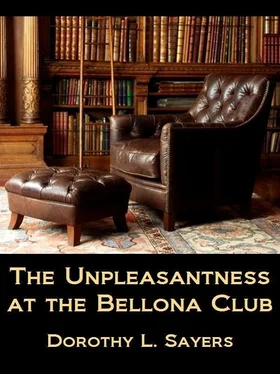“Artistic be damned!” said Wimsey, spluttering with fury, “it’s because I’m an ordinary person, and have met women, and talked to them like ordinary human beings.”
“You and your women,” said Parker, rudely.
“Well — I and my women, what about it? One learns something. You’re on the wrong tack about this girl.”
“I’ve met her and you haven’t,” objected Parker. “Unless you’re suppressing something. You keep on hinting things. Anyhow, I’ve met the girl, and she impressed me as being guilty.”
“And I haven’t met her, and I’ll swear she isn’t guilty.”
“You must know, of course.”
“I do happen to know about this.”
“I’m afraid your unsupported opinion will hardly be sufficient to refute the weight of evidence.”
“You haven’t any real evidence, if it comes to that. You don’t know that they were ever alone together; you don’t know that Ann Dorland knew about the will; you can’t prove that Penberthy administered the poison—”
“I don’t despair of getting all the evidence necessary,” said Parker, coldly, “provided you don’t keep me here all day.” He slammed the taxi-door.
“What a beast of a case this is,” thought Wimsey. “That makes two silly, sordid rows to-day. Well, what next?” He considered a moment.
“My spirit needs soothing,” he decided. “Feminine society is indicated. Virtuous feminine society. No emotions. I’ll go and have tea with Marjorie Phelps.”
Chapter XX
Ann Dorland Goes Misere
The studio door was opened by a girl he did not know. She was not tall, but compactly and generously built. He noticed the wide shoulders and the strong swing of the thighs before he had taken in her face. The uncurtained window behind her threw her features into shadow, he was only aware of thick black hair, cut in a square bob, with a bang across the forehead.
“Miss Phelps is out.”
“Oh! — will she be long?”
“Don’t know. She’ll be in to supper.”
“Do you think I might come in and wait?”
“I expect so, if you’re a friend of hers.”
The girl fell back from the doorway and let him pass. He laid his hat and stick on the table and turned to her. She took no notice of him, but walked over to the fireplace and stood with one hand on the mantelpiece. Unable to sit down, since she was still standing, Wimsey moved to the modelling-board, and raised the wet cloth that covered the little mound of clay.
He was gazing with an assumption of great interest at the half-modelled figure of an old flower-seller, when the girl said:
“I say!”
She had taken up Marjorie Phelps’ figurine of himself, and was twisting it over in her fingers.
“Is this you?”
“Yes — rather good of me, don’t you think?”
“What do you want?”
“Want?”
“You’ve come here to have a look at me, haven’t you?”
“I came to see Miss Phelps.”
“I suppose the policeman at the corner comes to see Miss Phelps too.”
Wimsey glanced out of the window.
There was a man at the corner — an elaborately indifferent lounger.
“I am sorry,” said Wimsey, with sudden enlightenment. “I’m really awfully sorry to seem so stupid, and so intrusive. But honestly, I had no idea who you were till this moment.”
“Hadn’t you? Oh, well, it doesn’t matter.”
“Shall I go?”
“You can please yourself.”
“If you really mean that, Miss Dorland, I should like to stay. I’ve been wanting to meet you, you know.”
“That was nice of you,” she mocked. “First you wanted to defraud me, and now you’re trying to—”
“To what?”
She shrugged her wide shoulders.
“Yours is not a pleasant hobby. Lord Peter Wimsey.”
“Will you believe me,” said Wimsey, “when I assure you that I was never a party to the fraud. In fact, I showed it up. I did, really.”
“Oh, well. It doesn’t matter now.”
“But do please believe that.”
“Very well. If you say so, I must believe it.”
She threw herself on the couch near the fire.
“That’s better,” said Wimsey. “Napoleon or somebody said that you could always turn a tragedy into a comedy, by sittin’ down. Perfectly true, isn’t it? Let’s talk about something ordinary till Miss Phelps comes in. Shall we?”
“What do you want to talk about?”
“Oh, well — that’s rather embarrassin’. Books.” He waved a vague hand. “What have you been readin’ lately?”
“Nothing much.”
“Don’t know what I should do without books. Fact, I always wonder what people did in the old days. Just think of it. All sorts of bothers goin’ on — matrimonial rows and love-affairs — prodigal sons and servants and worries — and no books to turn to.”
“People worked with their hands instead.”
“Yes — that’s frightfully jolly for the people who can do it. I envy them myself. You paint, don’t you?”
“I try to.”
“Portraits?”
“Oh, no — figure and landscape chiefly.”
“Oh!.. A friend of mine — well, it’s no use disguising it — he’s a detective — you’ve met him, I think…”
“That man? Oh, yes. Quite a polite sort of detective.”
“He told me he’d seen some stuff of yours. It rather surprised him, I think. He’s not exactly a modernist. He seemed to think your portraits were your best work.”
“There weren’t many portraits. A few figure-studies…”
“They worried him a bit.” Wimsey laughed. “The only thing he understood, he said, was a man’s head in oils…”
“Oh, that! — just an experiment — a fancy thing. My best stuff is some sketches I did of the Wiltshire Downs a year or two ago. Direct painting, without any preliminary sketch.”
She described a number of these works.
“They sound ever so jolly,” said Wimsey. “Great stuff. I wish I could do something of that kind. As I say, I have to fall back on books for my escape. Reading is an escape to me. Is it to you?”
“How do you mean?”
“Well — it is to most people, I think. Servants and factory hands read about beautiful girls loved by dark, handsome men, all covered over with jewels and moving in scenes of gilded splendour. And passionate spinsters read Ethel M. Dell. And dull men in offices read detective stories. They wouldn’t, if murder and police entered into their lives.”
“I don’t know,” she said. “When Crippen and Le Neve were taken on the steamer, they were reading Edgar Wallace.” Her voice was losing its dull harshness; she sounded almost interested.
“Le Neve was reading it,” said Wimsey, “but I’ve never believed she knew about the murder. I think she was fighting desperately to know nothing about it — reading horrors, and persuading herself that nothing of that kind had happened, or could happen, to her. I think one might do that, don’t you?”
“I don’t know,” said Ann Dorland. “Of course, a detective story keeps your brain occupied. Rather like chess. Do you play chess?”
“No good at it. I like it — but I keep on thinking about the history of the various pieces, and the picturesqueness of the moves. So I get beaten. I’m not a player.”
“Nor am I. I wish I were.”
“Yes — that would keep one’s mind off things with a vengeance. Draughts or dominoes or patience would be even better. No connection with anything. I remember,” added Wimsey, “one time when something perfectly grinding and hateful had happened to me. I played patience all day. I was in a nursing home — with shell shock — and other things. I only played one game, the very simplest… the demon… a silly game with no ideas in it at all. I just went on laying it out and gathering it up… hundred times in an evening… so as to stop thinking.”
Читать дальше












